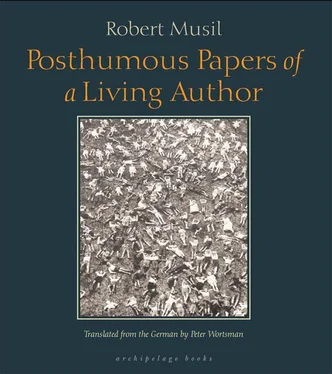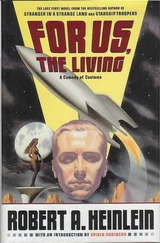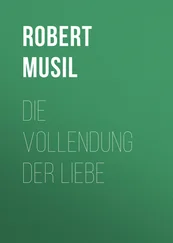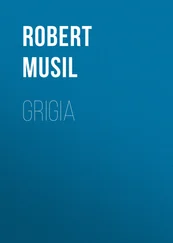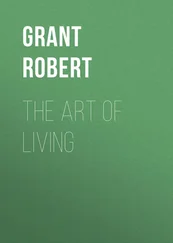He called it “mein kleines Lückenbüsser Buch” (my little stop-gap book), grudgingly acknowledging that “the little parts of which it was to be constructed. . were after all more durable than I had feared.” But anyone who has ever indulged in a Viennese Jause, or high tea, knows the refined finesse of a Viennese finger sandwich, and no one could prepare and pepper them quite like Musil. If anything, Posthumous Papers has aged well. History confirmed the dark prophetic poetry of his parables on dying anthropomorphic flies and the sadistic simian doings on a monkey island at the Roman zoo, so uncannily like a concentration camp:
Then the long, indifferent gaze nails its arbitrary victim [. .] With the release of a scream, the others rush apart on down the ditch; they flicker dimly about like the damned souls in the flames of purgatory, and gather chattering cheerfully as far from the scene as possible.
In the mini-essays that comprise part two, “Ill-Tempered Observations,” Musil takes aim at many of the sacred cows, theories and conceits of his time. He dispels the idyll of peaceful Nature so dear to the Teutonic heart:
Are there no seasoned naturalists from whom we can learn that the stalwart oak, today a veritable epitome of solitude, once spread in hordes [. .] That the spruce [. .] was a relatively recent interloper [. .] and where a variety of trees seem to conjure up an image of happy coexistence, they are really scattered combatants, the surviving remnants of enemy hordes crowded together, too tired and exhausted to continue battle! (“Who Made You, Oh Forest Fair. .?”)
He reveals the indecorous truth about the innate invisibility of monuments of which Vienna was so fond:
. . they are impregnated with something that repels attention, causing the glance to roll right off, like water droplets off an oilcloth, without even pausing for a moment. (“Monuments”)
He even dares poke piercing fun at the panacea of psychoanalysis:
If ancient man had his Scylla and Charybdis, so modern man his Wasserman test and Oedipus complex; for if he succeeded in eluding the former, and effectively setting a little offspring on its own two feet, he can be all the more certain that the latter will catch up with his son. (“Threatened Oedipus”)
Part three, “Unstorylike Stories,” includes a narrative nugget, “A Man Without Character,” from the seed out of which the novel erupted like a magic beanstalk.
Musil wraps up the book with a long short story, “The Blackbird,” arguably one of the eeriest, most exquisite works of German speculative writing, a product of what the author called “taghelle Mystik” (daylight mysticism). In three memories of strange visitations recounted by the narrator to a fictional friend — the first, the flight of a bird, prompting his leaving his wife; the second, a close scrape with death in the form of an aerial dart whizzing his way on the battlefield in World War I; the third, the reappearance of the fateful bird which now identifies itself as the reincarnation of his dead mother — the author manages seamlessly to bridge the great divide between “Wirklichkeitssinn” (sense of reality) and what he postulated as “Möglichkeitssinn” (sense of possibility), leaving the reader dangling over the abyss of doubt:
I had no thoughts of the kind that are supposed to come at death’s door, but all my thoughts were rather focused on the future; I can only say that I was certain that in the next second I would feel God’s proximity close up to my body — which, after all, is saying quite a bit for someone who hasn’t believed in God since the age of eight. (“The Blackbird”)
And while Musil did not invent the form of Kurzprosa (short prose), he managed to put his own original spin on it, with echoes of Nietzsche, Hoffmann and Poe. Bits and pieces of the book, alternately characterized as prose poems, fairy tales, fables, or just plain prose, subsequently found their way into various anthologies.
Having first shepherded English language readers up the foothills of Musil’s Posthumous Papers of a Living Author in preparation for the more arduous trek up the intellectual Everest of The Man Without Qualities , I would like to deflect a flicker of attention to celebrate this third edition of my translation. In so doing, I admit to feeling a bit like the overlooked Sherpa guide Tenzing Norgay at Sir Edmund Hillary’s salute, a bit like a graying gigolo flaunting an old love affair with Norma Jean before she became Marilyn Monroe.
Originally published in the U.S. in 1988 as Volume One of the splendid, albeit short-lived, Eridanos Library, Posthumous Papers was reissued in the U.K. by Penguin, and, now, a little more than a decade later, has once again been lovingly resurrected on this side of the Atlantic by Archipelago Books.
Musil’s little book already enjoyed a considerable following elsewhere, admired as it was in Italy, Spain, and particularly in France, where it had been expertly rendered by the Swiss poet-translator Philippe Jaccottet in 1965.
Still it took some prodding to pry open the American clam. Having published an excerpt in the literary journal Antaeus , and a longer selection entitled “Pictures,” as a workshop project of the Coalition of Publishers for Employment at Cooper Union, both in 1983, I amassed a slew of laudatory rejection letters from various and sundry editors and resolved to bury the translation in a heap of unwanted manuscripts at the bottom of a drawer. Then one day the telephone rang. It was a Mr. Juan Garcia calling from the remote mountain hamlet of Hygiene, Colorado. Mr. Garcia proceeded to inform me that he and his business associate, Andrea Nasi, had selected my translation to launch their new publishing venture. This on the urging of Juan’s father, the Mexican novelist Juan Garcia Ponce, who knew and admired the text in Spanish translation and had even published his own re-writing of “The Blackbird,” and on the advice of Ledig Rowohlt, principal of the German publisher Rowohlt Verlag, who knew my English take. And while translations as a rule do poorly in the American literary marketplace, the hot potato that nobody had thought marketable turned out to be a runaway literary hit.
Such acclaim for his “little stop-gap book” would have surprised no one more than Musil himself, for whom it was a mere afterthought to his monumental work. But afterthoughts can have a rich afterlife and monuments, as the author himself suggested in a text of the same title, risk invisibility. And whereas big books are often admired from afar and have a way of gathering dust, little books are more readily plucked off the shelf and stuffed into handbag and backpack, from whence they have a pretty good crack at the unconscious.
Peter Wortsman
